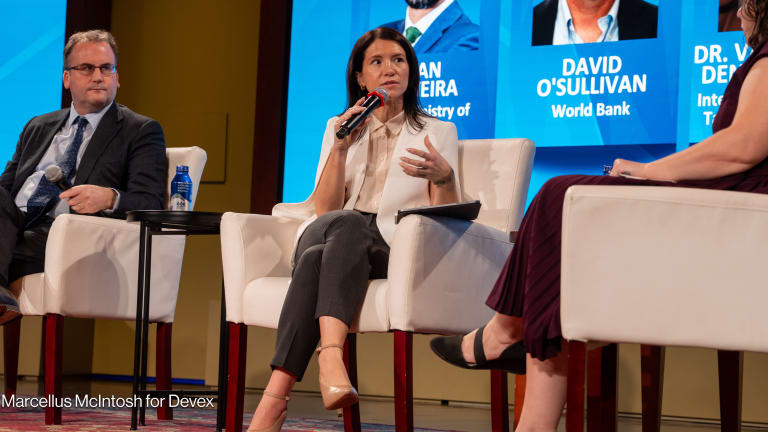Peter Sands calls on countries to reform taxes to free up funding for health

DAVOS, Switzerland — While new financial instruments can help address critical gaps in health care funding, the global health community also needs to be more focused on taxes and helping countries mobilize domestic resources for basic health care services, Peter Sands, the incoming executive director of the Global Fund to Fight AIDS, Tuberculosis and Malaria, told Devex.
“I think people in the world of global health need to be thinking about and talking about taxes rather more than we do, because if you have a country that is only mobilizing — in terms of fiscal mobilization, i.e. tax revenues — a single digit percentage of GDP, it’s extremely unlikely they will be able to sustainably finance a health system delivering even the basics to all its population,” he told Devex in a recent interview.
Countries need to plan for self reliance, rather than on international development assistance as a way to fund their health systems, and to get there, need to work on tax raising and tax deployment strategies, Sands said. Once the basics are covered, other finance — be it private finance or insurance — can be brought in to support other aspects of health systems, he added.
In order to do that countries and organizations such as the Global Fund, need to get better at communicating the economic or investment case for funding disease prevention and eradication. And there is a strong case to be made, Sands said. High prevalence endemic diseases take people out of the workforce — not only those who are sick, but also those caring for the people who are sick. Epidemics are particularly disruptive because they change economic activity as people are scared and change their behavior, children don’t go to school, etc.
“There are very strong, hard-nosed economic reasons for taking action, but we are not making that argument as well as we could,” he said. “We tend to make it in sort of standalone analyses, in reports and things that don't get integrated into the bits of paper sitting on a finance minister’s desk when they're making budget allocation decisions.”
See more related topics:
► CEPI, a year in: How can we get ready for the next pandemic?
► Opinion: Strong health systems are our best defense against pandemics
► 18 months in, how is WHO's health emergencies program working?
► How to bridge the gap between global health and development
The Global Fund can help play a catalytic role in helping bridge the gap between research and implementation. While it doesn’t have to do the research itself, as it would be best if it were done by economists or government officials in the countries where it is needed, the Global Fund can help develop the methodologies and data-gathering approaches that inform how the analysis is done, he said.
“Ultimately, we have to be able to build a compelling investment case for the Global Fund itself, but governments in individual countries have to build an investment case to deploy domestic resources to the same objectives,” Sands said.
Too often, the global health and development community preaches to the converted, he said, but to change perceptions there must be an effort to convince the skeptical, be it the civil servant in charge of budget prioritization in a finance ministry, or a capital markets analyst at an investment bank, he said.
“The way we need to do that requires a degree of rigor around what is it about health issues that impedes development,” Sand said. “We need to be able to tell that story in a very rigorous and robust fashion because in a sense the people who need to be convinced are not the people who we're normally talking to about this.”
No silver bullets
Sands will take up his post bringing with him a long career in finance, which gives him a unique perspective on some of the new financing mechanism, but doesn’t mean he has “the secret key to some treasure trove,” he said.
Innovative financing mechanisms — from impact bonds, to blended finance, matching funds and results-based funding — can all play “a significant and important role in what we’re doing both in terms of improving the effectiveness with which we deploy existing funds and in attracting new monies,” Sands said.
While there is promise in some of these mechanisms, they must be deployed in the appropriate situations, he said.
“Sometimes these things look like tools looking for a problem and I think we need to be very rigorous in identifying the underlying economics of the problem we are trying to solve and then picking the financing instrument that is best suited to that particular problem,” Sands said. “Sometimes, when I look at this in the development world, we seem to have force fit innovative finance mechanisms to problems where the economics dont really align with that mechanism.”
Global Fund plans
While Sands cautions that he is in the early stages of developing his perspectives, priorities, and strategies for the Global Fund, he has been meeting with staff and learning about the key challenges on each of the diseases.
One of the critical challenges is how the Fund manages the trajectory of when countries have graduated from direct support and how the fund can incentivize the deployment of domestic finance and work differently in those countries.
On TB for example, the fund cannot just work on its own, because so much of the TB burden is in middle-income countries, he said.
“We have to act as a bit of a catalyst here, getting others to think differently, mobilize funds more aggressively, deploy them more effectively in countries in which we're not necessarily delivering our funding directly, but that’s the only way we're going to get to our objective of ending the epidemic of TB,” Sands said. “So it’s going to force us to be incredibly collaborative and partnership oriented.”
There has been less progress in reducing infection rates and mortality on TB than on AIDS or malaria, and there hasn’t been as much scientific support, political leadership or community mobilization.
“If we just kind of continue the way we're going on it doesn’t feel like it’s going to get us to ending the epidemic,” Sands said. “I think there is a need on TB for a quite significant change on multiple dimensions of how we're tackling the disease, and if we really want to get on top of this disease then we absolutely should.”
On AIDS, the tools now exist to end the epidemic but questions remain about whether enough resources will be dedicated to doing so, and the rates at which young women and girls are being infected must also be addressed, he said.
On malaria, the tools may be there, but globally the community is not delivering as well as it needs to and “arguably we are at some risk of sliding backwards not least because of increased resistance to the drugs and the insecticides.”
Sands said he has been learning the organization and been struck by the importance of collaboration and the Global Fund’s reliance on partnerships, and how those partnerships will impact the success or failure or the organization. Sands has also learned the importance of data, and he’s likely to see the Global Fund continue to improve how it gathers data, analyzes it, and uses it to inform future decisions, he said.
Search for articles
Most Read
- 1
- 2
- 3
- 4
- 5








